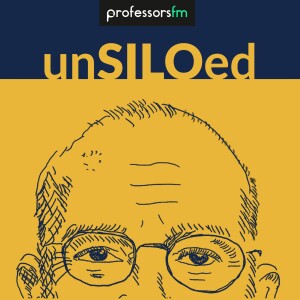
What is attention, and how can we manage it? The new science of attention explores how our conscious and unconscious attention dictate how we interact with the world. With the proliferation of digital media and always being on digital devices, a proper understanding of attention is more important than ever.
Gloria Mark is the Chancellor's Professor in the Department of Informatics at the University of California Irvine. Her new book, Attention Span: A Groundbreaking Way to Restore Balance, Happiness and Productivity, explores what is going on with attention in today’s culture and environment as well as how to regain the ability to focus and pay attention for longer periods of time.
Gloria and Greg discuss her new book and the ways in which attention is studied, as well as identify many real-world causes that may be in play for why the attention span of humans has been regularly getting shorter. Is there a cultural shift going on? Gloria links attention to sleep, health, and also even success in quitting unhealthy habits.
*unSILOed Podcast is produced by University FM.*
Episode Quotes:Attention is the currency of our time
48:48: I would love it, especially for young people, if they could have the experience of building their attentional muscles because it's a lifelong skill, and attention is really the currency of our time. And we can't perform well unless we have good attention.
Flow isn't for all situations or settings
23:42: No one should feel bad if they can't get into flow because we use an analytical mindset when we're doing knowledge work. And that can be very rewarding and fulfilling. So, flow isn't for all situations or settings; it can happen, but we shouldn't expect it in knowledge work.
Attention has different kinds of states
28:18: We can be engaged in something and challenged where we're using some mental effort, and I call that a state of focus. We can also be very engaged in something without hardly any mental effort; I call that rote attention.
Reframing our thinking about how we use technology
43:48: The main point I've tried to express in the book is that I'd like to reframe our thinking about how we use technology to put well-being first. (44:03) Instead of pushing ourselves to the limits, which is what the current narrative is, let's use technology to be as productive as possible. Let's think about maintaining psychological balance and positive well-being. Because if we're positive, we will be productive.
Show Links:Recommended Resources:- Herb Simon
- Stanford Entry for Bounded Rationality
- Walter Mischel
- Stanford Marshmallow Experiment
- Neuro-Ergonomics
- Mihaly Csikszentmihalyi
- Mihaly Csikszentmihalyi’s 8 Traits of Flow
- Albert Bandura
- Broaden-and-Build
- Faculty Profile at UC Irvine
- Professional Profile on UC Department of Informatics
- Speaker’s Profile on Chartwell Speakers
- Gloria Mark’s Website
- Gloria Mark on LinkedIn
- Gloria Mark on Twitter
- Gloria Mark on Talks at Google
- Gloria Mark on Google Scholar
- Article in Time Magazine
- Attention Span: A Groundbreaking Way to Restore Balance, Happiness and Productivity
More Episodes
Create your
podcast in
minutes
- Full-featured podcast site
- Unlimited storage and bandwidth
- Comprehensive podcast stats
- Distribute to Apple Podcasts, Spotify, and more
- Make money with your podcast
It is Free
- Privacy Policy
- Cookie Policy
- Terms of Use
- Consent Preferences
- Copyright © 2015-2024 Podbean.com







